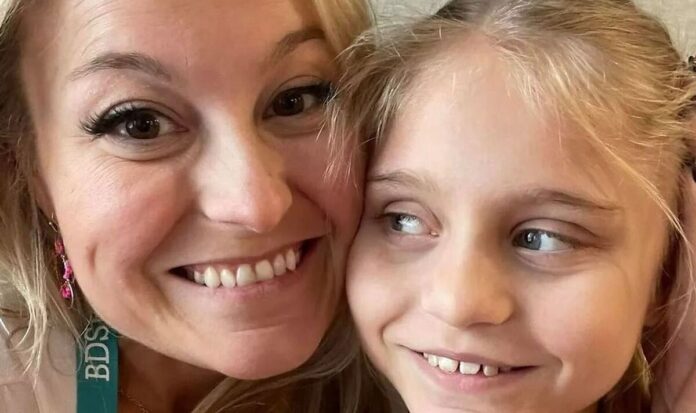There were no signs that Isla was anything other than a perfect, normal little girl (Image: Jacquelyn StockdaleGoFundME) A shocked mother has revealed how a routine eye test led to her then seven-year-old daughter being diagnosed with a rare form of dementia. Isla Edwards, now aged 10, was taken to see an optician after an eye exam suggested that she might need glasses. However, young Isla was diagnosed with Batten disease – a genetic condition that causes dementia during childhood, delayed development, seizures, blindness, and even premature death. Mum Jacquelyn Stockdale, 34, said: “At this time, there were no signs of anything being wrong with Isla. Her vision was a little fuzzy at long distances, but nothing out of the ordinary for a kid who was on the borderline of needing glasses.” Jacquelyn and Isla (Image: Jacquelyn Stockdale / Facebook) Isla was taken to see a paediatric ophthalmologist at Texas Children’s Hospital in Houston. Her mum recalls: “The doctors confirmed that Isla had early signs of paediatricmacular degeneration, and a genetic test would need to be done to determine the cause. “They swabbed her mouth and gave us a follow-up appointment for August when the results of the genetic test would be ready.” “On August 12, I was told that Isla’s genetic panel had come back positive for a diagnosis of neuronal ceroid lipofuscinoses. Upon further explanation, we learned this disease is more commonly known as CLN3 juvenile Batten disease, a very rare, extremely devastating fatal illness with no treatment or cure.” Detailing the heartbreaking ordeal that she was told lay ahead, Jacquelyn said: “I was told that Isla would very soon lose her vision completely, develop childhood dementia and epilepsy, that her mental cognition would start declining, and that her physical abilities would also start to deteriorate. The life expectancy for a child with CLN3 was late teens to early twenties.” Paediatric neurology expert Dr. Josh Bonkowsky said: “Batten disease is terrible; it’s one of many severe terrible diseases that strike infants and children. It starts slowly and then rapidly gets worse.” The cruel disease is one of a group of fatal genetic disorders that affect the body’s ability to get rid of cellular waste. Jacquelyn told Newsweek “There were simply no signs that she was anything other than a perfect, normal little girl. I had to come home and sit with our family and tell them this news, it was a horrific time. “We have never discussed any of this with Isla and still feel strongly that no child should have to carry the emotional weight of such a complex diagnosis.” In the two years since her diagnosis, Isla has lost 90 per cent of her vision. But she has adapted to her current vision level, is learning to read Braille – and still enjoys all the same activities she did before her diagnosis, such as swimming, dancing, video games. Jacquelyn says: “We don’t treat Isla’s vision loss as a sad circumstance or as something that is broken in her. It’s so important for us that she knows her vision impairment is not something that makes her less than. If anything, it makes her a stronger, more amazing person, and we couldn’t be prouder of who she is. “Vision impairment is the only symptom she displays of this disease, and we are fighting with everything we have to ensure it stays this way. We were told on diagnosis day that that day was the healthiest Isla would ever be, and that she was at her peak; two years later, and she has continued to defy that.” Isla’s story is being shared on Facebook , via a page called ‘Isla’s Faith: Isla Edwards’ Fight Against CLN3 Batten Disease’. The family has had huge support from the local community, which has raised $18,000 to help cover Islas’ medical costs. A GoFundMe page has raised more than $26.000
Mum’s agony after eye test showed seven-year-old daughter has dementia
Sourceexpress.co.uk
RELATED ARTICLES


